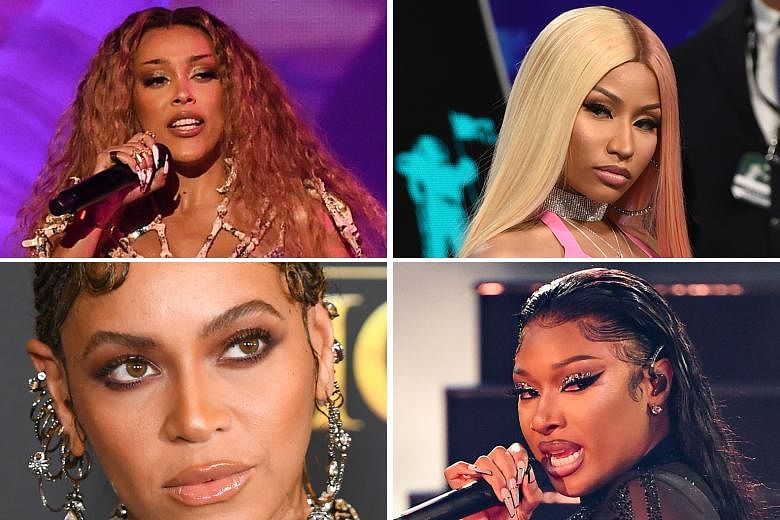If you were looking for a single week that captured the story of pop music this year - or maybe hit-making in the streaming era writ large - zoom in on the week of April 26.
On April 29, Beyonce and Megan Thee Stallion released a remixed, collaborative version of Savage, the swaggering Megan solo track that had already taken TikTok by storm. Two days later came another: Doja Cat's summery Say So, now with verses from her stylistic forebear Nicki Minaj.
Billboard watchers settled in for an epic chart battle, if only because everything else happening in the world was unimaginably depressing. Once the numbers had been tallied for the May 16 Hot 100 chart, Say So came out on top, with Savage (Remix) arriving at No. 2.
In a larger sense, though, it was a win for all four of them. This was the first time four black women had occupied the top two spots on Billboard's Hot 100 chart. And, two weeks later, when Savage (Remix) surged to No. 1, this sense of a shared coronation was even more palpable.
Widening the lens a bit though, these high-profile, fan army-uniting duets were the latest iteration of one of the year's defining pop trends. From May 16 until Aug 8, each song that topped the Billboard Hot 100 was a paired collaboration.
Musical collaborations are common in any era, and it is no coincidence that all three of the longest-reigning Hot 100 No. 1s are the product of multiple artists: the country-rap handshake that was Lil Nas X and Billy Ray Cyrus' 2019 Old Town Road remix; the 2017 global juggernaut Despacito, originally released by Luis Fonsi and Daddy Yankee, then given an English-language boost with a Justin Bieber remix; and Mariah Carey and Boyz II Men's 1995 all-star tear-jerker One Sweet Day.
When a single can appeal to multiple genre formats, cultural backgrounds and fandoms, it has the potential to move more units. But in a pop musical moment ruled by streaming numbers and algorithmic savvy, it has become even more clear why A-list collaborations have proved to be the safest chart bets.
Call it the Avengers era of pop music.
Take, for example, Rain On Me, Lady Gaga and Ariana Grande's house-pop team-up that hit No. 1 on June 6, the week after Savage (Remix). This was the second single from Gaga's album Chromatica, following Stupid Love, a dance floor thumper that did respectably if not spectacularly on the Hot 100, peaking at No. 5.
What is better than Lady Gaga's Little Monsters rallying behind a single? Little Monsters and Grande's Arianators rallying behind a single.
Solo or in a pair, Grande has been an exceptionally successful artist in the streaming economy, which also means she is a desirable power-duet partner. Bieber found this out when Stuck With U, their quarantine-themed charity single, went to the top of the chart on May 23.
"Empowerment" is one of modern pop music's most virtuous buzzwords, and it is easy for labels to spin these collaborations into inherently positive, feel-good narratives of mutual support. And given how white and male the Hot 100 has skewed in recent years, it is certainly refreshing to see so many black and female artists triumphing while ostensibly rejecting the idea that they are one another's competition.
But, especially in a year when touring was not a viable income stream, collaborative hits also seemed like savvier business strategies in the streaming era of diminishing returns. The ultimate proof of the power collaboration's ubiquity is in the way certain fan communities have started to boast about its opposite.
When BTS' first English-language single Dynamite hit No. 1 later in the year, for example, a frequent refrain was to marvel that they had done it with "no features".
Most pop actions have equal and opposite reactions, so perhaps the next trend, or next year's most coveted hit-making flex, will be the solo No. 1.
NYTIMES

